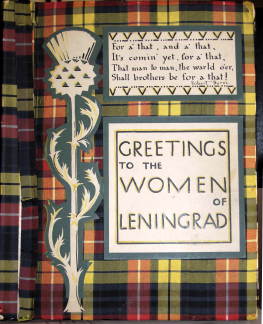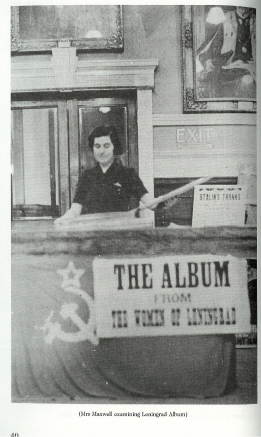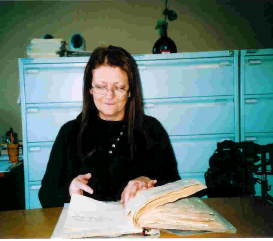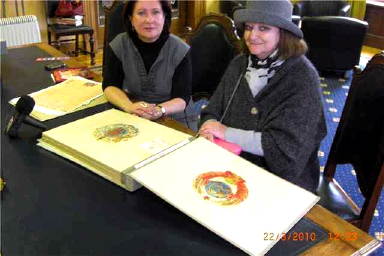The Leningrad Albums
Wilma Stark
 Less than two and a half months after June 22, 1941, when the Soviet Union was attacked by Nazi Germany, German troops were already approaching Leningrad. The Red Army was outflanked and on September 8, 1941 the Germans had fully encircled Leningrad and the siege began. It lasted for about 900 days, from September 8, 1941 till January 27, 1944. 2,887,000 civilians (including about 400,000 children), plus troops didn't even consider any calls for surrender. Food and fuel stocks were very limited (1-2 months only). All the public transport stopped. By the winter of 1941-42 there was no heating, no water supply, almost no electricity and very little food. In January 1942, in the depths of an unusually cold winter, the lowest food rations in the city were only 125 grams (about 1/4 of a pound) of bread per day. In just two months, January and February 1942, 200,000 people (!!!) died in Leningrad of cold and starvation. But some of the war industry still worked and the city did not surrender. In January 1943 the Siege was broken.
Less than two and a half months after June 22, 1941, when the Soviet Union was attacked by Nazi Germany, German troops were already approaching Leningrad. The Red Army was outflanked and on September 8, 1941 the Germans had fully encircled Leningrad and the siege began. It lasted for about 900 days, from September 8, 1941 till January 27, 1944. 2,887,000 civilians (including about 400,000 children), plus troops didn't even consider any calls for surrender. Food and fuel stocks were very limited (1-2 months only). All the public transport stopped. By the winter of 1941-42 there was no heating, no water supply, almost no electricity and very little food. In January 1942, in the depths of an unusually cold winter, the lowest food rations in the city were only 125 grams (about 1/4 of a pound) of bread per day. In just two months, January and February 1942, 200,000 people (!!!) died in Leningrad of cold and starvation. But some of the war industry still worked and the city did not surrender. In January 1943 the Siege was broken.
'NOTHING IS FORGOTTEN - NO ONE IS FORGOTTEN'
These are words written on a memorial to the 1,200,000 people who died in the Leningrad Siege of 1941-1944.
In 2004 I was asked to take part in a joint project between North Lanarkshire's Community Learning and Development, and Museums and Heritage departments. As a result of one of life's strange con-incidences... or was it?... I was asked to be the Writer in this new project 'Travel and Tales'. Along with an Artist, the purpose was to use the story of the Leningrad Albums to encourage new research, writing, and artwork. No one knew or realized at that point that I had such a close and personal involvement with the history of the albums.
The subsequent exhibition of the work produced in this project took place in February/March 2005, and again in September 2005 when visitors from St. Petersburg [formerly Leningrad] attended a civic reception in Summerlee Heritage Museum. It was also there that I was invited to visit St Petersburg with the St. Petersburg Forum, after meeting several of the Trustees.
All of the written and art work was displayed in visual form, and has now been given a permanent display base in Chapelside Community Centre, Airdrie which was formerly Chapelside Primary School, the school attended by my father, Harry Walker. He was the last surviving member of the committee who, in 1941, took the decision to collect and send messages of hope and solidarity, from the women of Airdrie and Coatbridge, to the women of Leningrad.
The committee comprised :
- William O'Byrne, Airdrie
- Agnes Maxwell, Airdrie
- Harry Maxwell, Airdrie
- Harry Walker, Airdrie
- Margaret Plant
Russia Today Society
 In that year of 1941, in the front room of a council flat in Airdrie, these six people attended a meeting of the 'Russia Today Society'. It has to be remembered, that at this time, the Soviet Union were Allies of Great Britain. It was a time of war. Communication was limited not just because of the war, but much of our modern technology and travel capabilities were not yet in existence. However the news trickling through underground sources, told of the horrific conditions in which the besieged citizens of Leningrad were struggling to survive. It was mainly the women [along with old men and children] who were running the city. [The majority of the men were fighting the enemy forces (Nazi Germany)] The citizens had little or no food, resorting at its worst to eating flowers and leaves off trees, and even boiling glue to make 'soup'. The winter of 1941/42 was also the coldest for a hundred years with temperatures dropping to -40*. Deaths from starvation alone were reaching more than 4,000 per day. This was the news that was filtering through. There was nothing physically that these six people could do. However they felt they could at least try to let these women know that they were not forgotten.
In that year of 1941, in the front room of a council flat in Airdrie, these six people attended a meeting of the 'Russia Today Society'. It has to be remembered, that at this time, the Soviet Union were Allies of Great Britain. It was a time of war. Communication was limited not just because of the war, but much of our modern technology and travel capabilities were not yet in existence. However the news trickling through underground sources, told of the horrific conditions in which the besieged citizens of Leningrad were struggling to survive. It was mainly the women [along with old men and children] who were running the city. [The majority of the men were fighting the enemy forces (Nazi Germany)] The citizens had little or no food, resorting at its worst to eating flowers and leaves off trees, and even boiling glue to make 'soup'. The winter of 1941/42 was also the coldest for a hundred years with temperatures dropping to -40*. Deaths from starvation alone were reaching more than 4,000 per day. This was the news that was filtering through. There was nothing physically that these six people could do. However they felt they could at least try to let these women know that they were not forgotten.
They trudged round the whole district, even during the blackout, collecting over 6,000 signatures - many more would have been collected but they only had a very short time-scale in which to gather the messages and signatures. They had to get them to London, and thereafter, they hoped, to Leningrad. With great care these signatures and messages were pasted into the pages of an album.
Margaret Plant designed the cover and decorated it with the local Buchanan Tartan, and lines from Burns' 'A Man's a Man for a' That'.
A deputation of housewives including Agnes Maxwell took the album to London and handed it over to the Soviet Embassy.
In 1988 the 'Dear Allies' book, written by Margaret Henderson was published by Monklands District Libraries. In this book Harry Walker spoke of the feelings of all those involved at that time in 1941... "We half-hoped that we would have some acknowledgement just to know that it had reached its destination."
In June 1942 a telegram was delivered to Agnes Maxwell, in Park Crescent, Airdrie. It confirmed that against all odds, the Scots Album had arrived.
Harry Walker remembered, "It was a miracle... It was unbelievable that women struggling with hunger and disease, and face to face with death, should find time to respond to our pledge of solidarity and admiration. The telegram was passed around with much gasping of disbelief, and weeping for joy."
A greater surprise was to come. A reciprocal album - The Leningrad Album - followed later in January 1943. It contained many messages in reply to those sent from the women of Coatbridge and Airdrie. There were also woodcuts and lithographs and poems by Leningrad's most esteemed artists and writers. When asked why the women of Leningrad had gone to such trouble under such dreadful circumstances, to reply to the women of Airdrie and Coatbridge, a Leningrad headmistress said...
" ... the unexpected gift gave them a chance to convince themselves, by demonstrating to others, that without food for their bodies, they could satisfy, through their own efforts, the hunger of their soul for beauty and art and harmony between nations."
(The photograph above is of Agnes Maxwell examining the album in 1943.
It was again on display in 1985.
Thousands of people filed past the album in Airdrie Town Hall.)
The world has spun around a great deal since then, but still to-day, when the pages of the album are turned, the feelings and emotions are the same as those in 1941, 1943, and 1985, as recalled again by Harry Walker... " Sadness and tears mingle with joy and happiness as the pages reveal both the beauty of the album, and the feelings of friendship and solidarity it represents."
Due to a Ministry of Information error, the album was presented to the Women of GLASGOW. However Agnes Maxwell corrected this 'misinformation' and although its permanent home became the Mitchell Library, Glasgow, it was subsequently displayed to the people of Airdrie and Coatbridge in 1943.
At last in January 2006, I was able to experience that same emotional journey. Along with the St Petersburg Forum, I enjoyed 5/6 event-packed days in the city formerly known as Leningrad.
A personal visit
 However the 'highlight' was my personal visit - I was privileged to receive special governmental permission - to see, read, and turn the pages of the original Scottish album sent all those years before by those six people, one of whom was my late father Harry Walker [he died in 1996]. I had grown up with the story of the albums. Throughout my life it flitted in and out of my consciousness. It was a great honour for me to be asked to be the writer of the 'Travel and Tales' project.
However the 'highlight' was my personal visit - I was privileged to receive special governmental permission - to see, read, and turn the pages of the original Scottish album sent all those years before by those six people, one of whom was my late father Harry Walker [he died in 1996]. I had grown up with the story of the albums. Throughout my life it flitted in and out of my consciousness. It was a great honour for me to be asked to be the writer of the 'Travel and Tales' project.
I knew of the high esteem in which were held these six people, by the people of St Petersburg. I knew the albums were still part of the Museum of the History of the Siege of Leningrad. I knew my father had visited the city twice. I knew that even today students of History knew their names. But nothing prepared me for the EXTENT or the DEPTH of the feelings. Nor how much I would, by association, be respected or continuously thanked. It was HUMBLING! I seemed to be in tears throughout my visit. My fellow-travellers who had not previously known the tales, were also so affected. Astounding, that 60 years on, it should be so! Or... maybe not...
The original album is kept today in a huge fortress - along with many of the country's rare and precious documents, and only rarely on display; not because the story is forgotten but because of its physical fragility. On the contrary following modern technological trends, it has now been 'digitalised' and can be seen on computer in the museum. I was accompanied on my visit by the Director, and Assistant of the Museum, and two interpreters, one of whom had been a child during the siege.
I started to turn the pages put together in 1941. I was full of the emotion of that original act of humanity. Signature after signature telling many tales of the 'classless' nature of it all... no boundaries... signatures from the 'posh hooses' alongside those of the working-classes... people from the Kirk and the Chapel, the factories, the offices, the management... I made comment on this as I went through. Everyone had wanted to be a part of it.
I came to the page on which were my mother and father's signature. I came across a written message, no signature, but I recognized the writing as my father's. He had not put his signature here because these were ostensibly messages from women to women. It was typical of the man I remembered. The people from the museum were delighted to know this, since this had been a mystery to them. I saw where my father had again signed when he had visited in the 1970's and the 1980's. I was also asked to sign.
As a result of my comments throughout, I was asked if I would make textual and auditory comments for the museum to go along with the album. I was no longer just my father's daughter, but a protagonist in this ongoing story; in this continuing communication and act of humanity.
Robert Burns said that 'Man's INHUMANITY to Man makes countless thousands mourn'...
We should however be inspired and full of hope to know, as proved by this tale, that also... Man's HUMANITY to man can make countless thousands rejoice and 'feed the hunger of their soul'.
 Andy Knight
Andy Knight
Since my visit to St Petersburg I have continued to research and keep the story alive. Andy Knight came to meet me while researching for his radio-documentary as part of his College remit. He subsequently won an award with this documentary and as a result of this has been contacted and ?mentored? by the BBC. He has again asked me to take part in and be involved in a short documentary for Online distribution with a view to a full commission if this successful. He has become as involved and passionate as I am about the core story of the exchange of Albums, and with his technical skills added to the mix...THE BEAT GOES ON.
More about Andy Knight and the albums.
Quotations and images
All quotations and pictures taken from -
Dear Allies by Margaret Henderson, Monklands District Libraries,1988.
(This book although out of print may still be available through the library services of North Lanarkshire Council.)
The Album sent to the people of Airdrie and Coatbridge is kept in the Mitchell Library. It can be viewed by arrangement. There is also there a digital copy of the album sent to Leningrad by the women of Airdrie and Coatbridge.
Digital versions of both albums can be viewed in the Museum of the Siege of Leningrad, St Petersburg.
The exhibition pieces of the 'Travel and Tales' project are on permanent display in Chapelside Community Centre, Airdrie. It can be viewed by arrangement.
 Please get in touch
Please get in touch
I would love to hear from anyone who signed the original album or their friends/relatives ,or anyone who remembers any tale relating to the album when it was on display.
I would particularly like to hear from any friend/relative of the other members of that original committee. I am aware this is very much MY version of this tale and there will be many other facets to it. Please get in touch with me, however insignificant you may think your information is. Any human interest commentary on the original album will help keep the story alive, and endorse that original act of humanity.
Photograph above of Wilma Stark with Karen Cunningham, Head of Libraries, Glasgow, looking through the Leningrad Album at the Mitchell Library.







